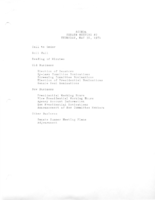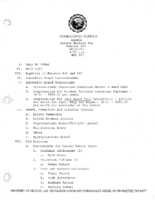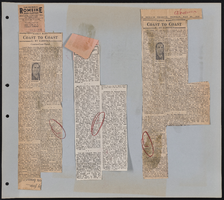Search the Special Collections and Archives Portal
Search Results

Meeting minutes for Consolidated Student Senate, University of Nevada, Las Vegas, May 30, 1978
Date
Archival Collection
Description
Text
Mary Jane Griffith Reiter Papers
Identifier
Abstract
The Mary Jane Griffith Reiter Papers date from 1919 to 1964. The papers document Nevada history and her family’s business and civic work; they contains her grandmother's will, a ledger detailing the costs and expenses for rental properties, and reports and minutes from the Colorado River Commission. It also includes a 1964 bibliography of materials on Nevada.
Archival Collection
Las Vegas Board of City Commissioners Records Regarding Water Supply
Identifier
Abstract
The Las Vegas Board of City Commissioners Records Regarding Water Supply (1927-1940) include correspondence, resolutions, petitions, application for a permit, and newspaper clippings. The records concern water shortages in the City of Las Vegas, Nevada due in part to wasteful water usage and many of the documents refer to City Ordinance No. 247. Several items are signed by Walter R. Bracken, Vice President and Agent of the Company, and A. M. Folger, Assistant Agent.
Archival Collection

The Wheel of Rotary Las Vegas Rotary Club newsletter, June 15, 1950
Date
Archival Collection
Description
Text

Meeting minutes for Consolidated Student Senate, University of Nevada, Las Vegas, May 30, 1974
Date
Archival Collection
Description
Text

Meeting minutes for Consolidated Student Senate, University of Nevada, Las Vegas, June 21, 1983
Date
Archival Collection
Description
Text

Transcript of interview with Helen Early by Dale Forshee, February 26 & 27, 1979
Date
Archival Collection
Description
On February 26 and 27, 1979, Dale Forshee interviewed Helen Early (born 1919 in Des Moines, Iowa) about her life in Southern Nevada. Early first talks about her arrival to Las Vegas and the early development of the city. She also talks about some of the first businesses in Las Vegas, the initial development of the University of Nevada, Las Vegas, and the early nightclubs and casinos in the city. Early also discusses her work in establishing a school for disabled children before discussing other topics related to McCarran Airport, Bugsy Siegel, Senator Walter Baring, the first churches in Las Vegas, and the Helldorado Parade.
Text

Ellen Barre Spiegel interview, December 4, 2017: transcript
Date
Archival Collection
Description
Ellen Barre Spiegel grew up in Jericho NY, a predominantly Jewish town in Long Island. Her ancestors had migrated to the United Sates prior to the outbreak of World War II. And for much of life her exposure to cultural diversity was limited. Ellen was born in 1962. She attended Cornell University, located in upstate New York, and graduated in 1984. Though the student population was 30% Jewish, the university expanded her knowledge of the world: her Protestant roommate explained that she had never met a Jew and Ellen replied, I have never met a WASP. Her college studies centered on consumer economics and she was a public policy major. Ellen was an early adopter of technology and her career path included positions at American Express, Prodigy (a joint venture of IBM and Sears), the Weather Channel, and Manufacturers Hanover Trust. Each company used her increasing experience with using technologies to improve connections with consumers. Ellen describes her Jewish identity as conservative and is a member of Midbar Kodesh Temple in Henderson. She talks about her bat mitzvah and her move back to New York to recite the mourner’s Kaddish for the year following the passing of her father. Later, she moved to Santa Monica, where she met Bill, her husband, using a new dating site called Luvitt AOL. After marriage, the couple saw financial advantages to living in Las Vegas and relocated their business and home to the valley in 2001. Soon Ellen noted that there was no active Democratic Club in Henderson and it became her mission to reignite the club. This launched a long list of political and civic accomplishments for Ellen. She has been an assemblyperson in the Nevada legislature (2008, 2013-2017). Her list of accomplishments and affiliations are on pages 46-47.
Text

Transcript of interview with Wilma and Burt Bass by Barbara Tabach, February 9 , 2015
Date
Archival Collection
Description
In 1939, Wilma (Frank) Bass was born in New York City, where she began her involvement in theater at the age of ten. Almost twenty years later, she met Burt Bass (1932- ) when both worked for a photography studio, one of Burt first post-high school jobs. Burt opened his first professional photography studio in 1962, shortly after he married Wilma in 1960. The couple soon had two daughters – Jill and Wendy – and moved to Las Vegas in 1974. Burt initially worked for his brother-in-law Ed Frank's check cashing businesses and later opened his own photography business, Burton Studio. He later added services such as fingerprinting, background checks, and photographs for identification cards. Wilma worked as a jewelry salesperson, first at the Gold Factory then at Nieman Marcus. Socially, she was very involved with Temple Beth Sholom’s Sisterhood, using her theater talents to write, direct and produce various shows for the Sisterhood, ORT as well as B’nai B’rith Youth Organization. In this interview, Burt discusses his photography business, the migration of its storefront around town, and his colorful landlords, including individuals like Moe Dalitz and Art Marshall. Wilma talks about her sales career in the local jewelry industry, and more extensively, she shares memories of her involvement in the Jewish community with theater productions. Much of the discussion revolved around related news articles and personal photos from their relationships and activities within the Jewish community. The couple also shares stories of friendships with local entertainers, including Jerry Lewis and Neil Sedaka.
Text

